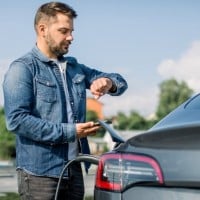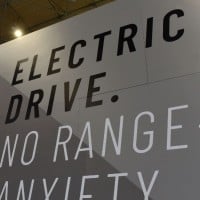Top 10 Issues with Electric Cars
It seems they're all you hear about these days, electric cars. Given the price of gasoline just keeps going higher and higher, electric cars have to be a better alternative, right? Well, not so fast. Hold your horses. This "alternative" wouldn't be anywhere as helpful as it sounds in theory if put to the test in reality. Buckle up, and let's go for a ride in a regular car, as I explain why we should stick with the regular pain at the pump and not make the switch to electric cars.
Electric cars are phenomenal, but if you can't afford high gas prices, the cost of an electric car will seem exorbitant in comparison. In my research, the cheapest electric car I found was more than seventeen thousand dollars, while the most expensive exceeded eighty thousand dollars. It's not uncommon for electric cars to cost more than twice as much as their gasoline-powered equivalents.
With that kind of money, you could easily afford two gasoline cars. Generally speaking, electric vehicles don't offer benefits that significantly outweigh those of traditional cars. You'd be paying twice the price for an electric vehicle, and even then, American electric cars are still quite underdeveloped compared to those that run on gasoline, petroleum, or diesel.
There are some well-developed electric cars, to be sure, but these generally come with extremely high price tags - around thirty thousand dollars. The only way a middle-class citizen could afford an electric vehicle is with government subsidies, which only increases your dependency on your country's government.

With a car that relies on gasoline, you wait about two minutes for the gasoline to fill the car's tank. While the pain at the pump is one of many factors that has made electric cars popular, in my opinion, the trade-off is not worth it. Electric cars might not have to deal with ridiculously high gas prices, but what you're not being told is how long it takes for an electric car to charge.
It takes around two days to fully charge the battery of a Tesla Roadster. Two days is the worst-case scenario, but that's the amount of time you'd be waiting if you plugged a Roadster into a wall socket in the US. The best-case scenario is that you'd be waiting around thirty-one hours for a Roadster to charge. This is dependent on the charger and battery pack being totally efficient, with no room for errors. The truth is, no device is one hundred percent efficient.
Even with fast-charging stations available, the charge time only drops by about 3.5 hours. And if you run out of battery power in an area where there are no charging stations, which is pretty much everywhere in middle America, you're absolutely screwed. As bad as gas prices are, switching to an electric vehicle could possibly be your biggest mistake. Maybe in a decade or two, they'll be more efficient, but for now, stick with high gas prices.

While I'm not against adapting to a modern world technologically, I am against risking burning myself and others to be modern. There have been plenty of reports of electric cars catching on fire. If you own an electric car, this fear will constantly be in your mind.
By definition, an electric car is entirely electric, making the risk of the car catching fire significantly higher than with a car that runs on gasoline. Additionally, there are concerns about what would happen if an electric car gets in an accident. The chances of an electric car being involved in an accident and not starting a fire are uncomfortably close.
This is one of the top reasons that prevent people from switching from petroleum vehicles to electric vehicles. Given that electric cars are still new on the market, there is little to no safety equipment available to prevent your electric car from becoming a fire hazard. Furthermore, even if there is something that can prevent your electric car from catching fire, it probably isn't a trusted product yet.

You would think that details like this would receive more media coverage, but despite being such a revolutionary invention, electric cars have many nuances that require further investigation. While electric cars are more eco-friendly than their petroleum counterparts, that's about where the advantages end. They don't offer better mileage than petroleum cars.
When comparing them to petroleum cars, a tank of gasoline can last around three to six months, depending on your daily driving habits and other factors. The average driving range for petroleum cars is between six hundred and eight hundred miles. On the other hand, the average driving range for electric cars is about sixty-eight miles. Furthermore, although there are battery charging stations, their numbers are limited, especially in the United States. There simply aren't enough of them to make much of a difference in how far electric cars can travel.
Rural areas are particularly disadvantaged when it comes to electric cars. The combination of a limited driving range and the long distance to the nearest charging station means that you can expect a slower journey when using an electric car.

At first glance, switching to an electric car might seem like a good way to avoid the high prices of gasoline, but appearances can be deceiving. When you charge your car at home, the charging port is connected to your home's electrical outlets. This means that owning an electric car will significantly increase your electric bill. This factor scares many people who are considering buying an electric car. Most of these individuals are already burdened with high electric bills even without the added cost of an electric vehicle.
Electric cars are so new that most people have not fully considered all the pros and cons of owning one. Until our homes are modified to handle the challenges that electric vehicles bring, owning one might be more of a burden than an asset. The only people who might not suffer from high electric bills are those who live in urban areas and can find a charging port at their workplace.
However, this doesn't solve the problem that suburban and rural residents will face. While electric cars might not raise your electric bill by more than fifty-five dollars per month, these costs can add up. If you're paying an extra fifty-five dollars each month, that amounts to an additional six hundred and sixty dollars on your annual electric bill.

Just about everyone will encounter a point in their life when their car breaks down, with a few exceptions. If your car breaks down, the natural instinct is to have it towed to a mechanic to diagnose the issue and repair it at a reasonable price.
If you bring an electric car to a mechanic for repairs or even an inspection, the chances are high that the mechanic won't know what to do. As of 2022, the number of mechanics trained to work on electric vehicles is quite limited. You might be better off taking your car to an electrician if it doesn't run on gasoline, although that should be self-evident.
On the bright side, as electric cars become more common, more mechanics are receiving training to work on them. However, in the meantime, if your electric car breaks down and you need it repaired, finding a competent mechanic is a roll of the dice. Many people lead busy lives and don't have the time to worry about whether or not the mechanic will know how to fix their electric vehicle.
Another point to consider is the cost of inspecting an electric car, which can range from $100 to $400. While this might not be a significant burden if you're on the cheaper end of the spectrum, a $400 inspection can be quite taxing on your wallet.

A car's battery is, in many regards, the equivalent of a heart for people and animals. A car needs one to function properly, and without one, it can do little to nothing. With that said, when a car battery stops working properly, you want to replace it as soon as possible and pay the minimal price to do so.
Considering that, it usually costs between two thousand dollars and ten thousand dollars to replace the battery of an electric car. The cost of the battery itself ranges from around one hundred and fifty dollars to about one thousand and five hundred dollars. It is extremely likely that you'll have to pay for a battery that costs one thousand dollars or more, as opposed to around two hundred dollars.
Not to mention that, in contrast, batteries for cars that run on gasoline rarely, if ever, exceed three hundred dollars. Replacements for petroleum-based car batteries are much cheaper as well. With few exceptions, petroleum battery replacements usually range from forty-five dollars to around two hundred and fifty dollars.
As far as economics go, electric cars have outrageously expensive replacement costs.

Let's face it: the narrative that electric cars are more environmentally friendly is one of the strongest arguments for making the switch from petroleum to electric cars. However, the claim that electric cars don't create any emissions whatsoever is a flat-out lie. While an electric car doesn't burn fuel or release emissions into the atmosphere the way a regular car does, the power for the vehicle doesn't just appear out of thin air.
Most of an electric vehicle's power comes from a coal-powered plant. Thus, when they say an electric car creates "zero emissions," this is more often than not a misconception. The coal-powered plant releases plenty of carbon emissions. Whether or not you buy an electric car, you will be releasing emissions into the atmosphere. The only difference is that electric cars release emissions indirectly.
For many potential investors, the fact that electric cars still pollute the environment, albeit in a different way than normal cars, is a turnoff. When your car itself doesn't release carbon emissions, but the plant it comes from does, you're not helping the environment any more than if you had a car that runs on petroleum. Electric cars will need to become even more technologically advanced than they currently are to have a significant impact on the environment.

If you look anywhere other than the United States, electric cars seem to be on the verge of becoming the new normal. Electric cars aren't more popular in Europe because they're inherently better there than here in the United States. It's because the government incentives on offer are more generous than what we provide to electric car owners in the United States.
The United States offers a tax rebate, essentially a "government-issued refund check," after someone purchases an electric vehicle. However, that's as far as the incentives go in the United States. European countries, on the other hand, offer ownership tax deductions, allowing owners to continue reaping benefits over time.
It sounds like Europe is capitalizing on these benefits to the fullest extent, while the United States offers only the bare minimum. You might be wondering why this matters. Government incentives are rewards that people receive for generally moving in the direction of the future. The more incentives that are offered, the more likely people will find something appealing in the deal. Given that the United States doesn't offer many enticing rewards, it's not surprising that Americans are reluctant to switch from petroleum to electric cars.

Electronics lose some of their power in cold temperatures, and the same can be said for electric vehicles. You can experience up to a 30% decrease in range and efficiency depending on how cold it gets. This likely makes electric vehicles unattractive to many Canadians. Issues reported by Tesla owners during the winter include cars not starting and door handles freezing, preventing the doors from opening.

Generally speaking, electric cars are smaller than their petroleum counterparts. While this has some advantages, such as making the car easier to park and potentially lower insurance and service costs, it also has some downsides. One of the most common complaints about electric cars is that, generally speaking, they have less cargo space than cars that run on gasoline.
To achieve maximum cargo space, which at best is equal to that of an average petroleum vehicle, you would have to fold down the back seats. This is partially because the battery in an electric car is extremely large. If your electric car needs more than one battery - and some do - that leaves little room for cargo. The weight of the battery can range from one thousand pounds to three thousand pounds, whereas a car that runs on gasoline has a battery that weighs around forty pounds on average.
The size of electric cars may decrease over time, but for now, they are not ideal for travel with lots of luggage. While they might seem like the future, they are not currently the future of travel. This could change with the introduction of electric trucks or through other advancements over time.